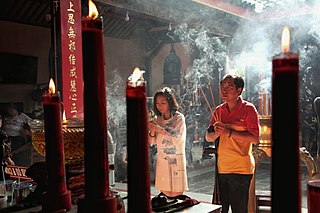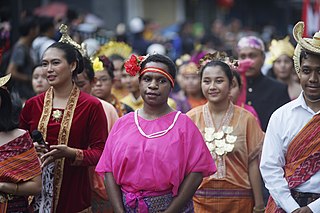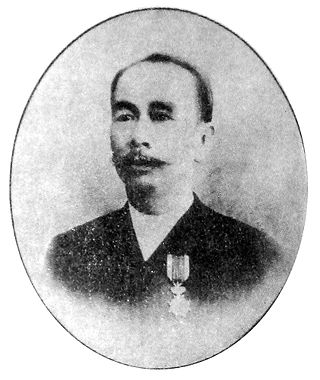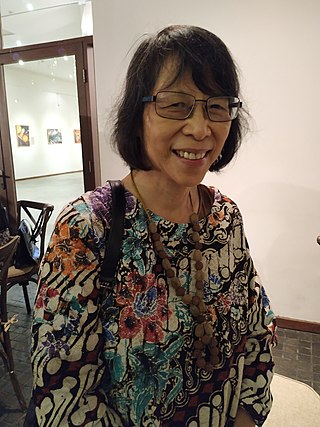
Chinese Indonesians, or simply Orang Tionghoa or Tionghoa, are Indonesians whose ancestors arrived from China at some stage in the last eight centuries. Chinese Indonesians are the fourth largest community of Overseas Chinese in the world after Thailand, Malaysia, and the United States.
Christianto Wibisono, also known as Oey Kian Kok was a prominent Chinese Indonesian business analyst in Indonesia. His father was Oey Koan Gwee and his mother was Lo Tjoan Nio.
Su Guaning is a Singaporean college administrator and academic who served as the president of Nanyang Technological University (NTU) between 2003 and 2011. He is currently President Emeritus of Nanyang Technological University (NTU).

Native Indonesians, also known as Pribumi or Bumiputra, are Indonesians whose ancestral roots lie mainly in the archipelago, distinguished from Indonesians of known (partial) foreign descent, like Chinese Indonesians (Tionghoa), Arab Indonesians, Indian Indonesians, Japanese Indonesians, and Indo-Europeans (Eurasians).
Marga Tjoa was an Indonesian popular romance and children's literature writer better known by the pen name Marga T. One of Indonesia's most prolific writers, she first became well known in 1971 for her serial Karmila which was published as a book in 1973 and later made into a film. As of 2006, she had published 38 novels.
Mely Tan Giok Lan, professionally known as Mely G. Tan, was an Indonesian sociologist. Tan obtained her bachelor's degree from the University of Indonesia, later receiving a scholarship to study at Cornell University. After finishing her doctorate at University of California, Berkeley, Tan returned to Indonesia and wrote extensively on economics and Chinese Indonesians. She was a founding commissioner of the National Commission on Violence against Women.

Phoa Keng Hek Sia was a Chinese Indonesian Landheer (landlord), social activist and founding president of Tiong Hoa Hwe Koan, an influential Confucian educational and social organisation meant to better the position of ethnic Chinese in the Dutch East Indies. He was also one of the founders of Institut Teknologi Bandung.
Thio Tjin Boen was a Chinese-Indonesian writer of Malay-language fiction and a journalist.
Tjerita "Oeij-se": Jaitoe Satoe Tjerita jang Amat Endah dan Loetjoe, jang Betoel Soedah Kedjadian di Djawa Tengah is a 1903 Malay-language novel by the ethnic Chinese writer Thio Tjin Boen. It details the rise of a Chinese businessman who becomes rich after finding a kite made of paper money in a village, who then uses dishonesty to advance his personal wealth before disowning his daughter after she converts to Islam and marries a Javanese man.
The Church of Christ in Indonesia, Gereja Kristus, is a Reformed denomination in Indonesia. Its mission began in the 19th century as a work among Chinese immigrants. In conjunction with Dutch immigrants, small congregations began to develop in cities throughout Java. In 1905, the Episcopal Methodist Church also started working in Java. The denomination was officially formed, as the Chinese Christian Church in 1939, then renamed itself after Indonesian independence as Gereja Kristus. It was reported by Reformiet Online as having 17 congregations and approximately 18,000 members, predominantly from West and East Java in addition to Southern Sumatra and Jakarta.
Liem Bwan Tjie was a prominent architect, and a pioneering figure of modern Indonesian architecture. He belonged to the first generation of professionally trained Indonesian architects.
Mona Lohanda was an Indonesian historian, archivist and academic, as well as a curator of the National Archives of Indonesia. She was a leading authority on the history of Batavia, as well as its Chinese-Indonesian community.
Chung Hwa Hui was a conservative, largely pro-Dutch political organization and party in the Dutch East Indies, often criticised as a mouthpiece of the colonial Chinese establishment. The party campaigned for legal equality between the colony's ethnic Chinese subjects and Europeans, and advocated ethnic Chinese political participation in the Dutch colonial state. The CHH was led by scions of the 'Cabang Atas' gentry, including its founding president, H. H. Kan, and supported by ethnic Chinese conglomerates, such as the powerful Kian Gwan multinational.
Kwee Kek Beng was a Chinese Indonesian journalist and writer, best known for being editor-in-chief of the popular Malay language newspaper Sin Po from 1925 to 1947.

Siem Piet Nio, who wrote under the pen name Hong Le Hoa, was an Indonesian language writer, magazine editor, journalist and Women's rights advocate from the Dutch East Indies who was active during the 1920s and 1930s.
Cham Tao Soon is a Singaporean academic and engineer. He was the founding president of the Nanyang Technological University.

Star Weekly was an Indonesian language magazine published in Jakarta, Indonesia from 1946 to 1961. The magazine was an offshoot of the popular newspaper Keng Po and is considered to be a precursor to today's Kompas. Through its charismatic editor Petrus Kanisius Ojong it became a widely-respected forum for Chinese Indonesian intellectual discussion, cultural expression, and critical political coverage.

Sinar Sumatra was a Malay-language newspaper published in Padang, Dutch East Indies from 1905 to around 1941 or 1942. It is generally considered a Peranakan Chinese publication, although it had European publishers and Minangkabau editors as well. During the pre-World War II period it was one of the most widely-read Malay language newspapers in Sumatra.
James Danandjaja, born Tan Soe Lien was an Indonesian anthropologist known as the foremost scholar on Indonesian folklore. He was a professor of anthropology at the University of Indonesia for nearly twenty years, establishing the field of Indonesian folkloristics. He studied under the eminent anthropologist Koentjaraningrat and renowned folklorist Alan Dundes.

Melanita Pranaya Budianta, born Tan Tjiok Sien and better known as Melani Budianta, is an Indonesian scholar of feminism, postcolonialism, and multiculturalism.







